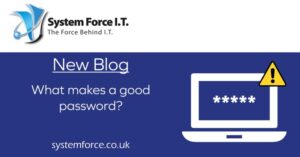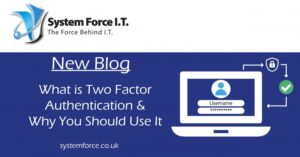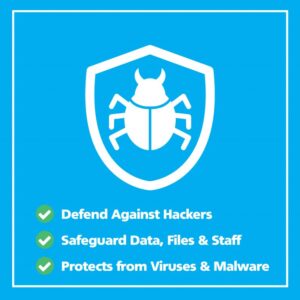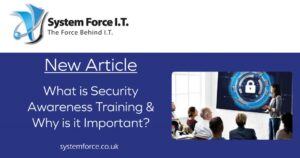
Businesses’ first vulnerability is a weak password. Cyber security as a topic is hot right now, with many well-known brands like Uber and Rockstar being hacked – having a good password is vital to securing your online accounts.
We highly advise to also enable two-factor authentication with a password, as a secondary security layer from another source, that safeguards against hackers.

Using a strong password for company systems, data, and individual devices can help prevent attackers from getting quick access to credentials and deploying deadly malware.
Using a good strong password forces hackers to spend more resources into attempting to get into your account.
If your password is strong enough, with several characters, and has both uppercase and lowercase letters, numbers and symbols, whilst being 12 characters – Security.org gives the hacker 34,000 years to successfully hack your account.
Stronger the password, the less likely you will be hacked and your data will be accessed by someone else.
Computer-generated passwords are typically extremely secure since they contain a variety of special symbols like @ or %.
However, we frequently use expressions, everyday words, or something memorable, like their dog’s name, that can be quickly found and compromised.
Hackers will initially try to test various passwords, such as pet names or other memorable information because it is statistically most often used throughout passwords.

Passwords are designed to be impossible for anyone else attempting to log in.
Making it easy for hackers means providing them the ability to hack you, steal your data, or hold you for ransom for your own information.
Users are encouraged to change their passwords every 30 days, not include memorable or easily guessable phrases, but to customize phrases with symbols and special characters.
Using the same password for all of your important accounts is risky and can be easily compromised by anyone, not just hackers.
If you have the same password for all of your essential accounts and one of them has its e-mail address and password compromised, the hacker has access to your password for all accounts.
Hackers frequently gain passwords through breaches, and they routinely try the same password on several accounts to see whether it works, hence advised to change your password every 30 days.
Enabling two-factor authentication throughout your online accounts can help protect up to 99.9% of hacks that try and get into your account (Source; Microsoft)
Being aware of various security procedures is important, as a user and as an employee. Understanding what can be malicious and what’s safe to use/click on can help a business safeguard its databases and devices.

>> Click here to read more about Cyber Awareness Training <<
It is strongly advised that you change your password frequently, if not every 30 days. This is a healthy habit to get into and can help you stay secure for longer, particularly if a breach has occurred that isn’t known about.
A good way to create a strong and memorable password is to use three random words.
Use memorable words to you, and be creative when picking a password, so that people can’t guess your password.
Cybercriminals are incredibly intelligent, and they are aware of many of the straightforward substitutions we make, such “Pa55word!” which substitutes symbols for letters.
Never use the following personal details for your password:
Ultimately – it’s up to you on how you protect your accounts and devices.
The more secure your password is, the more difficult it is for someone to access or try to hack your accounts.
When you add an additional layer of security, such as two-factor authentication (2FA) or multi-factor authentication, your security footprint grows and it becomes harder to hack into your accounts.
System Force I.T. can help your business with various types of important cybersecurity solutions.
We assist in the management of computer security, data protection, e-mail security and web filtering, IP security, and, most importantly, cyber security.
Our staff also supports your business towards becoming Cyber Essentials Certified, offering you far more opportunities with Government organizations and demonstrating that you take security seriously.
Click here to read How Cyber Essentials can help win new business & awards…
Click here to get in contact with us today to find out more!
System Force IT provides 24/7 IT support and engineering help with all our services. Our IT infrastructure management team are responsible for the backbone of your business. Monitoring and maintaining both physical and virtual services in real-time.